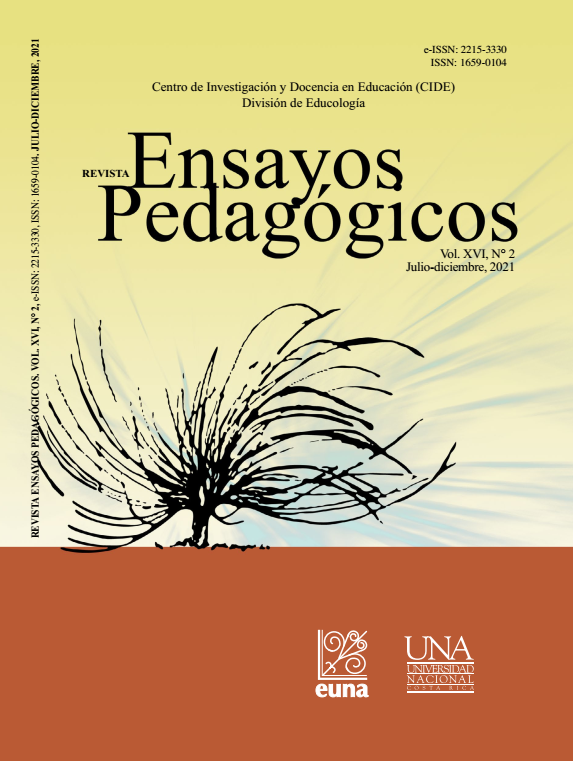Analysis of Scientific Inquiry-Based Teaching and Job Prospects of Peruvian Students on PISA 2015
DOI:
https://doi.org/10.15359/rep.16-2.9Keywords:
Peru, scientific approach, teaching methods, vocational trainingAbstract
The main purpose of this article is to translate some statistical evidence from the 2015 Pisa science test in order to foster pedagogical reflections guiding the educational work in science classes due to the fact that there is a significant gap between the information obtained from large scales assessments and the acquired knowledge by the educational actors directly involved. The PISA test outcomes usually consist of extensive volumes of information, mostly written in English, which means the access to such knowledge is restricted in its scope. In addition, the technical nature and, very often, the statistical approach of the reports made by PISA might be overwhelming for the majority of teachers who are not accustomed to this type of writing. Consequently, this is a bibliographic review work focused on providing a pedagogical approach to the PISA 2015 data, concerning the negative association between Enquiry-Based Science Teaching (hereafter referred to as EBST) and science-related cognitive outcomes, and expectations of a career in science expressed by Peruvian students. The results of the analysis showed the absence of a common definition of EBST. They showed that a larger number of EBST are not related to better learning outcomes; besides, the main factor for achieving successful learning in students is based on teachers. Results also revealed, with regard to activities by students in science classes, that the less frequent ones refer to designing and conducting practical experiments on their own, making decisions and discussing investigations. Regarding job expectations, the percentage of Peruvian students with attempting to pursue a major in STEM-related fields exceeds the average across OECD countries. However, motivations were mainly utilitarian.
References
Clough, M. (2015). A Science Education that Promotes the Characteristics of Science and Scientists: Features of teaching. K-12 STEM Education, 1(3), 113-121. https://doi.org/10.14456/K12STEMED.2015.23
Cué-Brugueras, M., Díaz Alonso, G., Díaz Martínez, A. G., y Valdés Abreu, M. de la C. (2008). El artículo de revisión. Revista Cubana de Salud Pública, 34(4), 1-11. https://doi.org/10.1590/S0864-34662008000400011
Furtak, E. M., Seidel, T., Iverson, H., y Briggs, D. C. (2012). Experimental and Quasi-Experimental Studies of Inquiry-Based Science Teaching: A Meta-Analysis. Review of Educational Research, 82(3), 300-329.
Guadalupe, C., León, J., Rodríguez, J., y Vargas, S. (2017). Estado de la Educación en el Perú. Análisis y perspectivas de la educación básica (1. a Ed.). FORGE. https://n9.cl/hlae
Haraway, D. (2004). Testigo_Modesto; Segundo_Milenio.HombreHembra;_Conoce_Oncoratón: Feminismo y tecnociencia (E. Torres, Trad.). Editorial UOC.
Kuhn, D. (2012). Enseñar a pensar (A. Negrotto, Trad.; 1. a Ed.). Buenos Aires: Amorrourto.
Lustick, D. (2009). The Failure of Inquiry: Preparing Science Teachers with an Authentic Investigation. Journal of Science Teacher Education, 20(6), 583-604.
Maiztegui, A., González, E., Tricárico, H., Salinas, J., Pessoa de Carvalho, A., y Gil, D. (2000). La formación de los profesores de ciencias en Iberoamérica. Revista Iberoamericana de Educación, 24, 163-187. https://rieoei.org/historico/documentos/rie24a07.PDF
Minedu. (2015). Rutas del Aprendizaje 2015. http://www.minedu.gob.pe/n/noticia.php?id=31811
Minedu. (2016). Programa Curricular de Educación Secundaria. Ministerio de Educación del Perú. Lima. https://n9.cl/f9bwl
Minedu. (2017). El Perú en PISA 2015. Informe nacional de resultados. Oficina de Medición de la Calidad de los Aprendizajes. Lima. https://n9.cl/nsk72
Minedu. (2020a). Factores asociados al desarrollo de la competencia científica en estudiantes peruanos según PISA 2015. Oficina de Medición de la Calidad de los Aprendizajes. Lima. https://n9.cl/e7pay/a
Minedu. (2020b). “Recursos de Ciencia y Tecnología”. Aprendo en casa. https://aprendoencasa.pe/#/planes-educativos/modality.ebr.level.secundaria.grade.4.speciality.cta.sub-speciality.0/resources
Minner, D. D., Levy, A. J., y Century, J. (2010). Inquiry-based science instruction—What is it and does it matter? Results from a research synthesis years 1984 to 2002. Journal of Research in Science Teaching, 47(4), 474-496. https://doi.org/10.1002/tea.20347
Mostafa, T., Echazarra, A., y Guillou, H. (2018). The science of teaching science. OECD Publishing. https://www.oecd-ilibrary.org/content/paper/f5bd9e57-en
O‘Connell, C. (2014). Inquiry-Based Science Education Primer to the international AEMASE conference report. Berlín: All European Academies (ALLEA). https://n9.cl/e5l7j
UMC. (2019). Informes pedagógicos de ciencia y tecnología. http://umc.minedu.gob.pe/informes-pedagogicos-de-ciencia-y-tecnologia/
UMC. (2020a). Resultados: evaluaciones de logros de aprendizaje. http://umc.minedu.gob.pe/resultadosnacionales2019/
UMC. (2020b). ¿Qué aprendizajes logran nuestros estudiantes? https://n9.cl/ymu19
OCDE. (2014). PISA 2012 Results: What Students Know and Can Do (Volume I, Revised edition, February 2014). Student Performance in Mathematics, Reading and Science. OECD Publishing. https://doi.org/10.1787/9789264208780-en
OCDE. (2016a). PISA 2015 Results (Volume I): Excellence and Equity in Education: Vol. I. OECD Publishing. https://doi.org/10.1787/9789264266490-en
OCDE. (2016b). PISA 2015 Results (Volume II). Policies and Practices for Successful Schools: Vol. II. OECD Publishing. https://doi.org/10.1787/9789264267510-en
OCDE. (2017). PISA 2015 Assessment and Analytical Framework: Science, Reading, Mathematic, Financial Literacy and Collaborative Problem Solving. Revised edition. OECD Publishing. https://doi.org/10.1787/9789264281820-7-en
OCDE. (2019). PISA 2018 Results (Volume I): What Students Know and Can Do: Vol. I. OECD Publishing. https://doi.org/10.1787/5f07c754-en
OCDE. (2020). Quiénes somos. https://www.oecd.org/acerca/
Reyes, P., Elgueta, A., y Reyes, I. (2018). Modelo de desarrollo de competencias docentes para el aula diversificada, experiencia desde el Programa Indagación Científica para la Educación en Ciencias-ICEC. En C. Everaert (Ed.). La enseñanza de la ciencia en la educación básica: antología sobre indagación e inclusión (1. a. Ed.) (pp. 48-73). Innovación en la Enseñanza de la Ciencia, A. C. https://n9.cl/e5uh9
Sáez, R. E. (2010). La OCDE y el ingreso de Chile. Estudios Internacionales, 43(166), 93-112.
Schunk, D. H. (2012). Teorías del aprendizaje: Una perspectiva educativa (6.a ed.). Pearson Educación. https://n9.cl/yizs
Unidad de Estadística Educativa del Ministerio de Educación del Perú. (2019). Magnitudes de la Educación-ESCALE. Estadística de la calidad educativa. http://escale.minedu.gob.pe/magnitudes
Published
How to Cite
Issue
Section
License
Ensayos Pedagógicos is subscribed to the Attribution-NonCommertial-NoDerivatives 4.0 International Creative Commons Licence, which allows both authors and readers to freely download, store, copy, and distribute the final approved publisehd version of the manuscript (post-print) as long as this is done without commercial purposes, no derivative works are generated, and the source and author are mentioned. As well, Ensayos Pedagógicos declares that authors will remain the rightful owners of the copyrights of their work in perpetuity.







